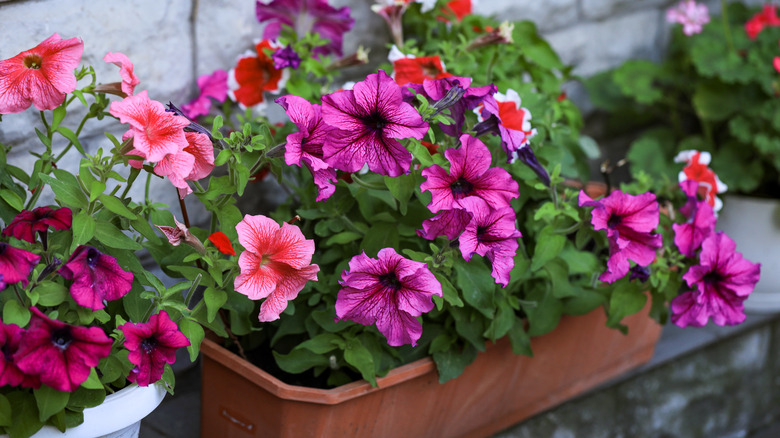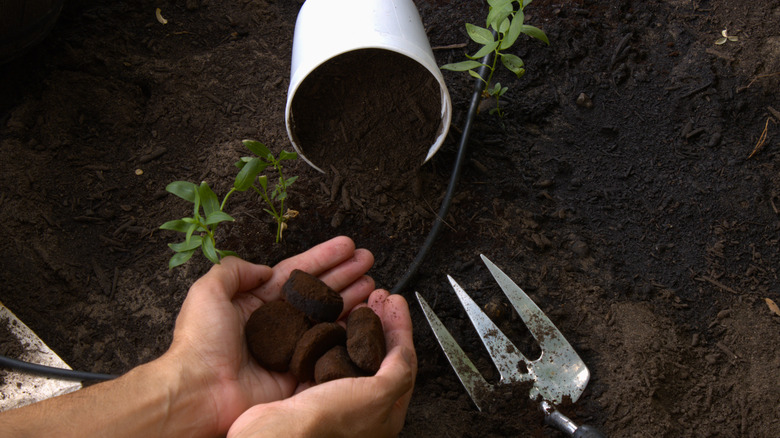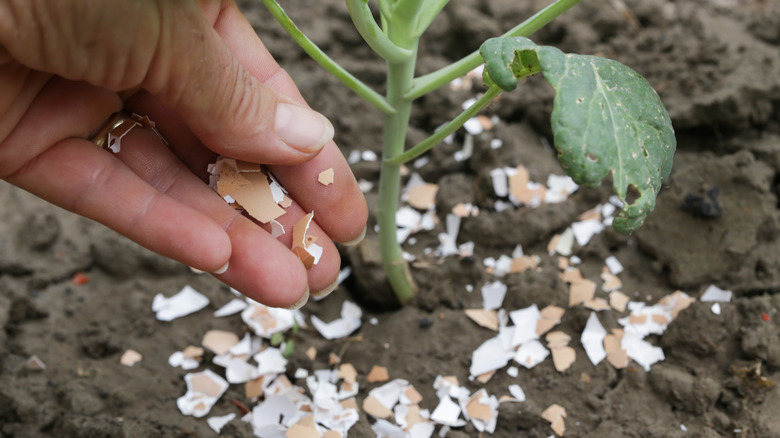The Two Types Of Kitchen Waste That Will Give Your Petunias A Boost
If you're growing petunias and want a budget-friendly way to keep them healthy, you may not need to look further than your kitchen scraps. Two common leftovers — coffee grounds and eggshells — can give these popular flowers a gentle boost, especially when used as part of a well-rounded soil care routine with other flowers to plant with petunias.
Used coffee grounds contain small amounts of nitrogen, potassium, and phosphorus, along with minerals like magnesium, iron, and zinc. These nutrients help support leafy growth, which leads to better blooms. While they aren't strong enough to replace fertilizer, coffee grounds feed soil microbes and improve structure as they break down. That extra microbial activity can also help the soil drain better and stay loose.
Eggshells help in a different way. They're made mostly of calcium carbonate, which slowly releases calcium into the soil as the shells decompose. Petunias use calcium to build strong stems and support new growth. Eggshells also offer small amounts of other nutrients, but their biggest benefit is reinforcing cell structure.
How to use coffee grounds safely in petunia beds
Coffee grounds can give your soil a boost, but only if you use them the right way. While they do contain small amounts of nitrogen and minerals, the nutrients aren't immediately available. That's why composting them first is often the best move. Adding coffee grounds to your compost pile, along with leaves, grass clippings, and other scraps, gives soil microbes time to break them down. Once composted, the grounds create a rich, crumbly humus that not only benefits petunias but also works well for other plants and shrubs that like coffee grounds.
If you want to apply coffee grounds directly to the soil, keep it light. Spread no more than a half-inch layer and mix it into the top few inches of soil. Avoid dumping them in one spot because the grounds are fine-textured and can form a crust that stops water from soaking in. It's also important to understand that fresh grounds tie up nitrogen temporarily as microbes decompose them. To avoid slowing your petunias' growth, consider pairing the grounds with a bit of fertilizer or composted manure to balance things out.
Despite the rumors, used coffee grounds won't change your soil's pH much. Most of the acidity is removed during brewing, leaving the grounds close to neutral. Even if mold forms on saved grounds, don't worry, it's part of the natural breakdown process. Just be sure to use coffee grounds in moderation, especially if you're skipping the compost step, to avoid overwhelming the soil and stressing your plants.
Using eggshells to boost petunia growth
Eggshells might be a useful soil amendment for petunias, but they work best when finely ground and used with patience. Whole or cracked shells take a long time to break down in soil, sometimes years. To speed things up, rinse and dry your shells first, then grind them into a coarse powder using a blender or food processor. This makes it easier for soil microbes to access and release the calcium and trace minerals inside.
You can mix the powder directly into garden soil before planting. Keep in mind that this is a slow process. If you're looking for an instant calcium fix, this isn't it. Some gardeners try to extract calcium faster by making "eggshell tea"—steeping shells in water or boiling them. While this is safe, keep in mind that the calcium transfer may be minimal, as one eggshell only adds 4mg of calcium to the water, whereas an eggshell contains around 2,000+ mg total.
A more effective option is to toss crushed eggshells into your compost pile. While they won't fully break down during composting, they'll soften and distribute more evenly into the garden. Just be careful not to overdo it. Too many eggshells in a small space can slowly raise soil pH, which may affect how well petunias absorb nutrients like iron.


